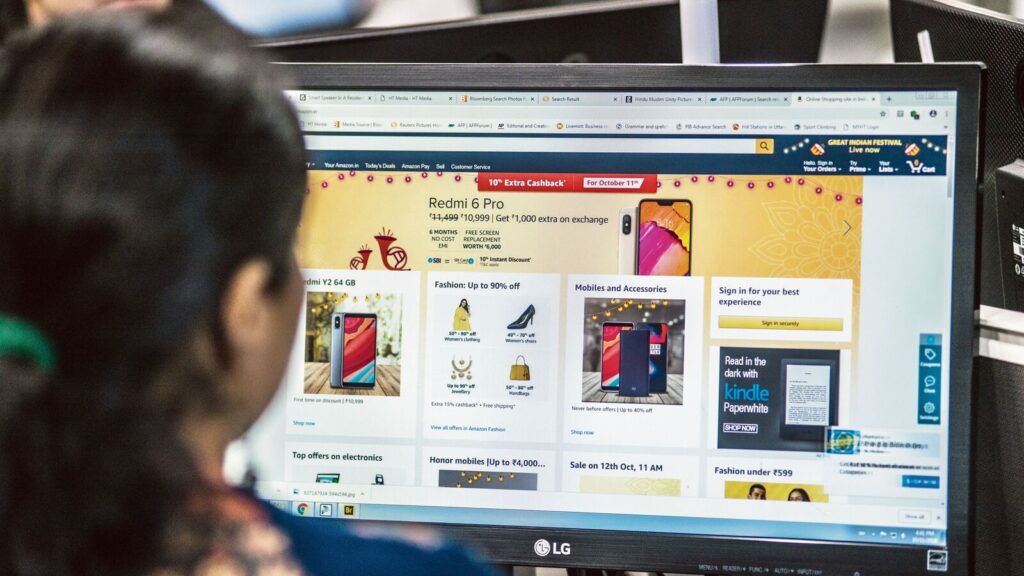The development also signals a more cautious approach to regulating the sector as India weighs the potential impact on foreign investments and domestic e-commerce players in the evolving global trade landscape.
“It is not the right time to go ahead with the release of the e-commerce policy, given the changing global geopolitical scenario,” one of the two people said on the condition of anonymity. “With trade dynamics shifting and uncertainties looming, we need to carefully assess the potential impact before moving forward.”
With Washington adopting a more protectionist stance under the Donald Trump presidency, India is recalibrating its approach, focusing on broader trade negotiations and strategic partnerships.
Objectives and resistance
The policy, which aims to tighten regulations on data governance, competition and consumer protection, is currently being evaluated at the top level of the Indian government. It was also designed to regulate online marketplaces better, creating a fair and competitive environment. It has faced resistance from foreign e-commerce giants because of proposed restrictions on foreign direct investment, data localization requirements and increased compliance burdens, among others.
The policy, which was expected to be announced in 2023, has encountered repeated delays. The final round of stakeholder consultations was held in August 2023.
Also read |India preparing strategic plan to set up over 50 e-commerce export hubs, target $100 billion in exports
“The Department for Promotion of Industry and Internal Trade (DPIIT), which is tasked with developing balanced legislation in coordination with the Department of Consumer Affairs, is treading cautiously on the matter and weighing the broader implications of any regulatory move,” said the second person.
Currently, India’s e-commerce sector is regulated by multiple government entities, including the ministries of consumer affairs, electronics and information technology (MeitY), and commerce. These ministries handle different aspects such as consumer protection, data governance and trade practices.
Also, key issues like data privacy, marketplace liabilities, and foreign direct investment (FDI) rules for e-commerce players continue to be debated.
Queries emailed to the secretary of the Department for Promotion of Industry and Internal Trade
(DPIIT), and spokespersons of PMO, ministries of commerce, consumer affairs, Amazon and Flipkart remained unanswered.
Also read |Delhivery has turned profitable and is set to ride the e-commerce boom
In response to an emailed query, a US Embassy spokesperson suggested approaching the Indian government for comments on its policy proposals or plans.
Economic impact
According to a report by Pahle India Foundation (PIF), a Delhi-based policy research institute, e-commerce has been a key driver of employment generation in India. On average, online vendors employ 54% more people and almost twice the number of female employees compared with offline vendors.
Online vendors have generated 15.8 million jobs in India, including 3.5 million for women, with about 1.76 million retail enterprises participating in e-commerce activity, said the August 2024 report.
Strategic focus
“We should ease outdated foreign exchange rules to benefit from the new Trump tariffs on China. Restrictions like the 25% discount cap for e-commerce exports and stringent invoice reconciliations make it hard for small businesses to grow,” said Rahul Ahluwalia, founder of the Foundation for Economic Development, a policy advocacy firm.
Also read |Govt may include e-commerce data, expand coverage to calculate retail inflation
“We must prioritize economic fair play, especially with American firms. Trump favours tariffs to counter unfair practices, and as the US is a key strategic partner, fair trade measures are in our interest,” said Ahluwalia.
Mint reported on 1 January, 2024 that the policy was being scrutinized by the Prime Minister’s Office (PMO) to understand its potential impact on domestic retailers and small players.
Mint reported on 22 November 2023 that the proposed e-commerce policy might not mandate online firms to register on the Open Network for Digital Commerce (ONDC). Instead, the policy proposed voluntary registration, marking a shift from the government’s earlier stance.
According to an Invest India report, the country’s e-commerce market is set to grow to $325 billion and the digital economy to $800 billion by 2030.
India, with 881 million internet users, is the world’s second-largest online market. Its growing digital economy could make it the third-largest online retail market by 2030, as per the Invest India report.
Source:https://www.livemint.com/politics/policy/ecommerce-regulations-online-marketplaces-amazon-walmart-flipkart-donald-trump-us-tariffs-data-privacy-11739350959711.html

